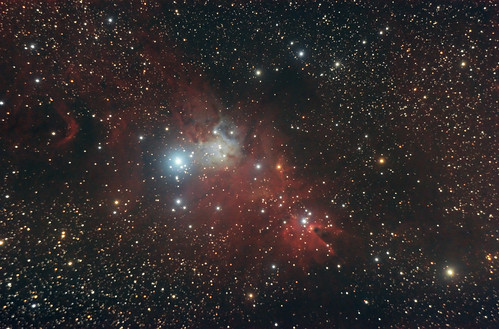Small… but how small is small? Is it really as small as it appears or is it just more far away than currently perceived? Isn't it all simply relative to the context of the situation anyway?
After a short walk several weekends ago I removed a massive stone from my left shoe, before squeezing into my compact Ford motor vehicle. When I held the offending stone up to the light of the sun, betwixt my thumb and forefinger, I found that I was able to completely block out the sun from my right eye, if I held the stone close enough to my face. Perceiving this minute aspect of our world, via just two dimensions, might pose several difficult questions; thus the necessity for a third.

Much thanks to Rich B-S' photostream
The ladybirds, upon which I could not help but tread, during the aforementioned walk, were (and are) minute, but try explaining that to the aphids, upon which they feast. We, on the other hand, are massive yet insignificant- really not 'worth it'- upon a tiny pebble in space, revolving about a flaming furnace that is a million times larger than our ‘home.’
The sun, by comparison, is a small star amongst billions upon billions, the largest of which is far, far less than a pinprick, lying suspended within the black void of infinite space. In some contexts even infinite might be considered as relatively small, we just can't know for certain.

Thanks to Skiwalker79's photostream
The self-serving company director (or CEO as our increasing Americanisation demands that we now refer to these individuals) is really small, when judged by our value standard, or is it just that, should we ever be unfortunate enough to encounter one, that they are actually further away than assumed, not really small at all, merely scampering- chauffeur-driven, of course- from one money making venture to another? Is it really all just a matter of inter-dimensional perspective?
I for one certainly hope that this effectively smoke-and-mirrors equation will not be judged to suffice. It took humanity right up until the times of The Renaissance to create the crudest of rules for depicting basic diminution in a linear and two-dimensional form. Fortunately the concept has evolved somewhat since then; we recognise that the lines, for want of a better term, were never really straight in the first place; or perhaps were straight, but will never actually appear so. Paolo Uccello's 'Battle of San Romano' would have benefited immensely from such an understanding. Just imagine the work that still needs to be done in order to even guess at the relative proportions of living entities existing, possibly simultaneously, in separate dimensions.
For now 'small', in all its non-specificity, may have to suffice.
I have found it 'easier'- although, in reality, far from easy- to consider the CEO as no bigger or smaller than any of his- it's almost certainly a man- fellow human beings, yet his individual actions to have assumed a disproportionately huge impact. As humans, globally speaking, are essentially small then small it should be and that is both small in physical presence and ideally in any attributable wider impact.
In this world the CEO is largely fascinated with, or satisfied by, sparkly things, items with attached financial worth, possessions, individual acts of self-centredness. I would contest that it really is no coincidence that when a CEO accidentally finds himself having to share any given space with a fellow human being that he appears to us as disproportionately small; just large enough for us to notice his seemingly ethereal physique. Somewhat ironically, this is almost certainly because he virtually lives in a parallel world, in which we are merely inconveniences that might serve an expensive meal, shine a shoe, polish a step, or indeed undertake nearly all of the actual work that has enabled said businessman to harvest such immense rewards. Were we not effectively the real earners he might by now have dissolved completely from the world that we inhabit.

Thanks to googly's photstream
Of course, it is highly unlikely that we shall ever be quite so fortunate as to witness the passing of the CEO, from our world and into his better, brighter, bigger, fresher and more lavishly-rewarded world, where he will be rather less of a bother to the rest of us. Scientifically, as our laws of science or economics operate, this world would be unsustainable, by virtue of the simple and irritable fact that he actually generates very little in the manner of genuine value, he simply takes a great deal more than he has, in fact earned.
I, personally, believe that it is only with a deeper understanding of what could actually be happening that we might finally be able to get to some form of grips with the whole sorry affair. And the root to this understanding is to be found, I would contest, in the most unlikely of sources, most unlikely.
So, journey, back with me, if you will, to the days of just the three TV stations, yet curiously a far more lavish array of entertainment, and an altogether differently structured world. Recall, if you can, the outrageously and ill-conceived diet of sci-fi that might occasionally have graced our TV screens; aliens, time and space travel and parallel universes; how we were thrilled at the idea that maybe, just maybe, one day...
But, in our heart of hearts, we all 'knew' that such was the stuff of fairy tales and make-believe, even though we might have shivered just a little in our beds, before sleep would eventually win the day. We thought we knew, didn't we, but what if the 'what we thought we knew' had transpired to be aberrant and the sound sleeping that we undertook had conspired to be founded upon false hopes? What then, eh?
Alan Guth has obviously put a great deal more thought into this kind of stuff than have I, so my references will be somewhat more brief. If you want the more thorough and well articulated version feel free to check it out, but beware the mind-numbing challenge of fully grasping the concept- don't say I didn't warn you!
Let us entertain the idea that Alan Guth is correct- remember, he's put a great deal more time and thought into this than we have, and he's got a vastly superior scientific brain. Let's ponder the 'inflationary universe', with its growing 'bubbles' of 'false vacuum decay' and let's wander down the 'every conceivable combination of universes' theory, this being vastly the more credible of the current alternatives.
Speculate with me, for a moment, upon the infinite possibilities, just millimetres from our own world. Might it not be possible, nay highly probable, that journeying between said alternative universes is (somewhere) commonplace? Might there not be an alternative where it is possible for us all to snuffle up far more than we deserve, and to perceive such as only right and just? Imagine, slipping, unawares, from one such dimension, 'seamlessly' into another. What if? There are so many of these 'false vacuum decay' bubbles, just bumping about, so to speak; whoops and before you know it you're mere millimetres away, in a almost perfect carbon copy universe, with far from carbon copy ideals. Carry on as normal!
I believe that it is only with this deeper understanding of what is happening that I have been able to spot the little devils at all. You see, despite its almost alarming compactness, the CEO mind is deceptively arrogant in its ability to enchant that of the corruptible human; "What if that were me?" the dimwits (corruptible humans) might be forgiven for believing.
Suddenly big is not so big, rather more standard, and infinite seems suddenly relatively minute. But even within such an arrangement of conceivably infinite possibilities and infinite space, is it not undoubtedly the case that the space occupied by the CEO is still far too big?







No comments:
Post a Comment